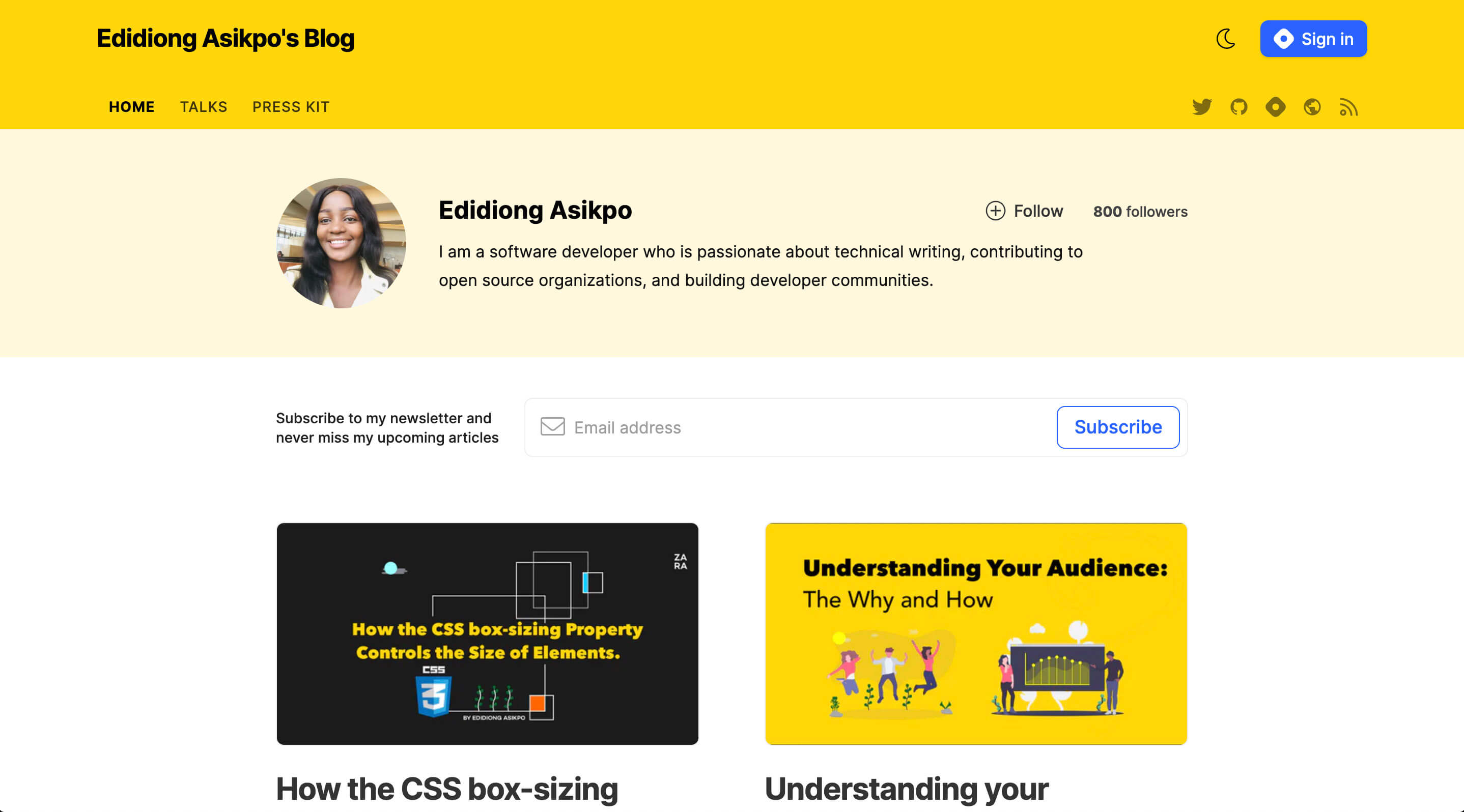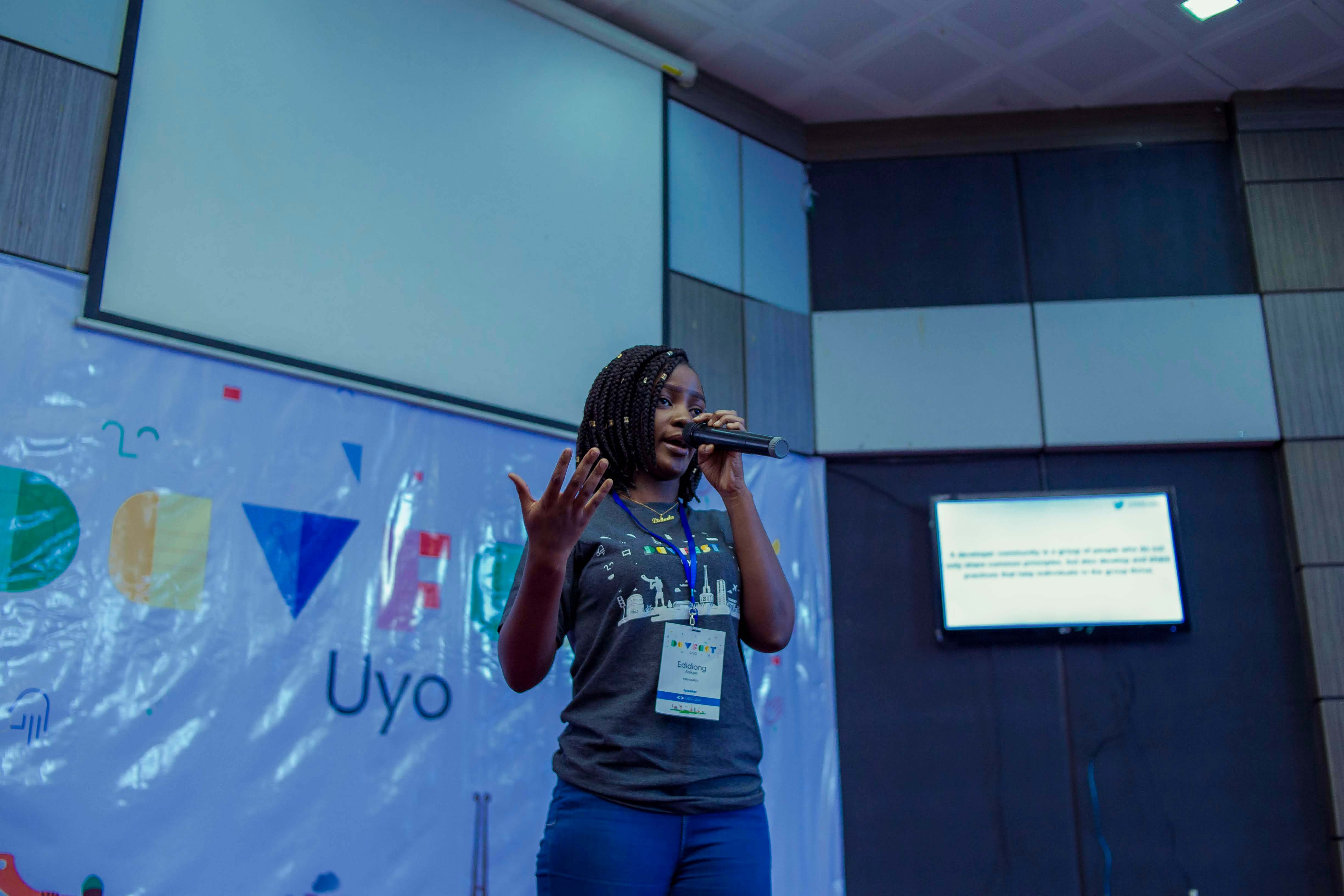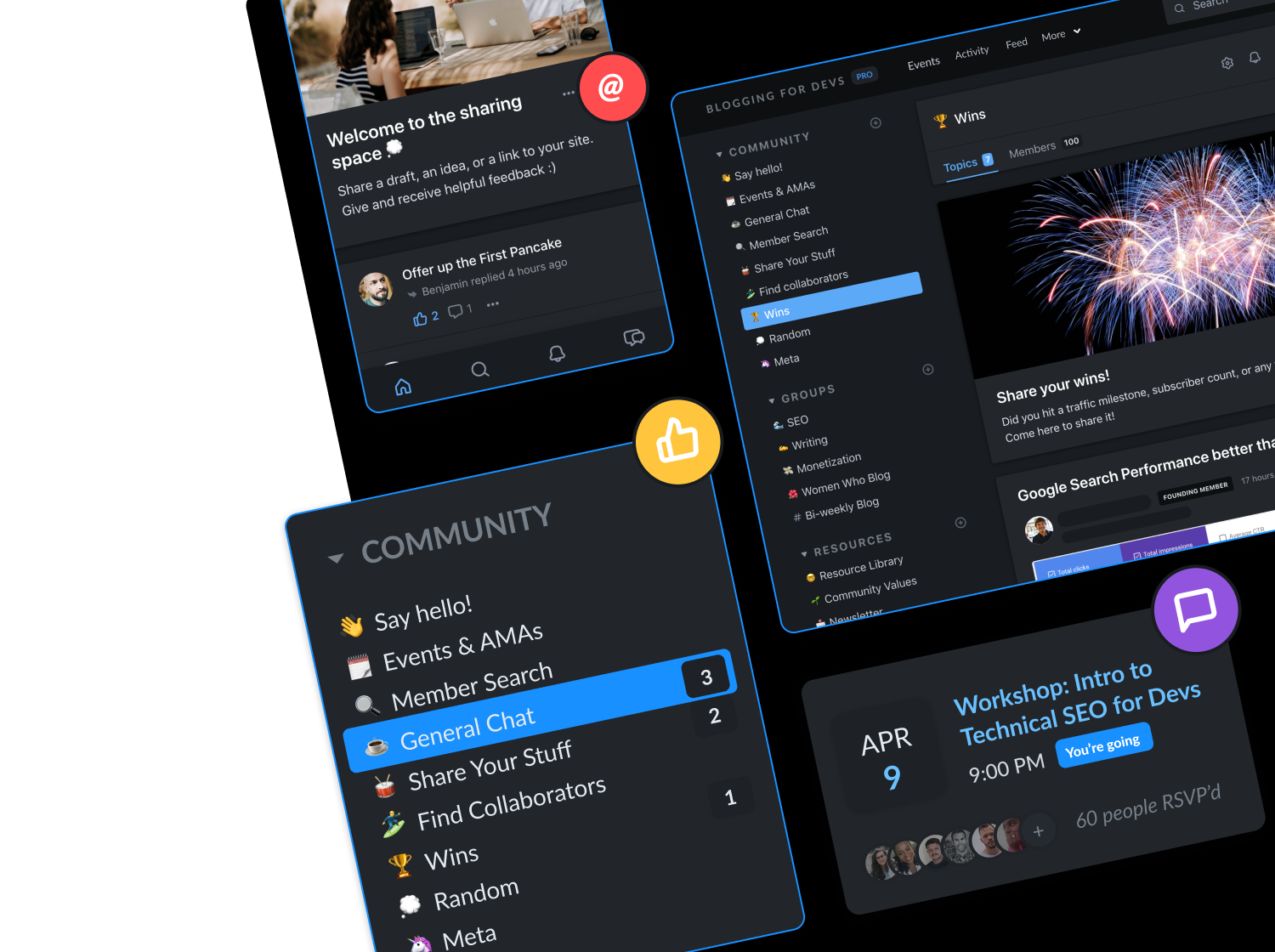Why Understanding Your Audience is the Key to Blogging Growth with Edidiong Asikpo

Monica Lent published
Hey everyone! This week I'm here with Edidiong Asikpo, a software engineer working with the Developer Relations team at Interswitch Group in Lagos, Nigeria.
I first got to know her through Blogging for Devs, and was impressed by the traction I saw her content gaining on Twitter. She's a pro at technical writing and has spoken at numerous tech conferences on topics like getting started in open source, getting accepted to Google's Season of Docs, and breaking into tech.
In this interview, Edidiong shares:
- Practical tips for sharing tech articles on Twitter (and getting traction)
- How to repurpose content in multiple formats to reach a new audience
- How to make your tech articles stand out in a sea of tutorials
- Why understanding your audience is the key to crafting good titles
- How she grew her readership through blogging within a community
Let's meet Edidiong and learn more :)

Hey Edidiong! Can you tell us a little bit about yourself and how you got into tech?
My name is Edidiong Asikpo. I live in Lagos, Nigeria where I work as a Software Engineer in the Developer Relations team at Interswitch Group. I am very passionate about technical writing, contributing to open source organizations, and building developer communities.
I initially wanted to study Medicine & Surgery at the University because my Dad wanted me to be a medical doctor. Along the line, I remembered I loved taking Computer Science classes in high school, so I opted to study Computer Science.
My University education was quite bland and typical, in the sense that the method of teaching was mostly theoretical, there was hardly any practical teaching involved. But, the turning point for me came in my 3rd year at the University when I joined Start Innovation Hub as an intern.
I learned how to develop mobile applications and was so excited by the fact that I could build some features I saw and used on most mobile applications. This excitement made me love tech and it's been great so far.
How did you go from learning to develop mobile apps to blogging about it?
A few years ago, I experienced difficulties in expressing myself through writing and it affected me in diverse ways, so I decided to be intentional about improving my writing skills.
I initially started by reducing the number of times I responded to messages on social media in short form and read a lot of articles by different creators.
One day, I stumbled upon this quote “You only learn how to write by writing” and it dawned on me that the only way I could learn how to write was to actually start writing something. - And that was it for me.
You only learn how to write by writing.
Over time, my writing skill improved, people were able to understand concepts that they didn't understand before because they read my article, and I also made my first million Naira through writing.
How do most people find your blog, and what’s been the most effective way to grow your readership?
To the best of my knowledge, people find my blog either through Hashnode’s feed or my social media page.
Hashnode enables developers to create a full-fledged and optimised blog on their domain for free. The level of readership I gain on my Hashnode-powered blog is really amazing because every time I publish an article, it's automatically shared to the developer community on Hashnode.

Before I share any article I write on social media, it is read by a good number of people on Hashnode which is quite intriguing.
Sharing my articles on Twitter has also increased the readership on my blog as well. I studied the way popular blogging platforms and developer communities share articles on social media for over a week trying to figure out what made their tweets get a lot of interactions and why people clicked on the articles they shared and I realised it was because they provided a brief description of the article the shared and also mentioned the name of the author as well.
I gave it a try and guess what? It worked.
New article on my blog ✨✨#javascript #dom #webdevelopment #CodeNewbie https://t.co/gGE800RqBq
— Edidiong Asikpo👩🏾💻 (@Didicodes) May 5, 2020
In the tweet above, I only said I had published a new blog but I didn't add any description about the content of the article.
As a web developer, the Document Object Model (DOM) is one of the most important concepts worth understanding.
— Edidiong Asikpo👩🏾💻 (@Didicodes) May 9, 2020
In this article @didicodes explains the DOM, it’s tree-like structure, and how to target & manipulate the DOM with JavaScript.#javascript https://t.co/gGE800RqBq
However, in this tweet, I explained the importance of the article to web developers and also addressed myself in the third person. This article was retweeted by a good number of people, the views on the article spiked up and I even got over 200+ new followers because of the article.
I noticed that some of the tech talks you’ve given in the last year are also posts on your blog. What’s your process for repurposing content into different formats?
It’s interesting to see that you noticed this Monica.
Well, in the process of preparing for some tech talks, I write down the things I want to say first to help me improve the flow of the talk then convert the write up into slides.
On a certain occasion, I figured repurposing my talks into articles will be a win-win situation because I’d get to reach two different audiences via speaking and writing.

The format of the talk is slightly different from the article because slides have to be straight to the point to give speakers an opportunity to explain while articles have to contain the necessary information to enable the reader understand the message being passed without talking to the writer directly.
For instance, this article: Technical Writing: What and How? was inspired by my speech on technical writing in Developer Circle Lusaka, Zambia. So far, the article has reached more people than the number of people I spoke to at the event.
It has become a reference for people who want to learn about technical writing.
Which of your articles has been most successful so far, and why do you think that was?
I’d say Open Source Contributions: A Catalyst for Growth because I used a practical example while pointing out how open source contribution is a catalyst for growth.
I believe using practical examples in technical articles make the readers understand the article more or connect more with the story or message.
For instance, if you write an article about the JavaScript DOM tree, a good practical example for this would be the family tree in biology.
There are so many tutorials being published in the developer space on a daily basis. What do you do to make your articles stand out?
People read articles and documents in different ways. The more they relate it to real life examples and situations, the more they understand.
Identifying, understanding and tailoring my content for a specific audience make my articles stand out.
When you understand the audience, you will be able to tailor your article to meet their needs and automatically pass the message effectively.
To understand my audience, I ask myself certain questions such as who they are, why they are reading the article and what they expect from it.
That’s why it’s good for your articles to be named in a very descriptive way - Instead of naming an article “A Deep Dive Into Understanding React” when the content is about Rendering Elements in React and disappointing the readers who were expecting to be knowledgeable about everything in React after reading your article, use the right title that describes exactly what you wrote in your article like “How to Render Elements in React”.
Do you have a regular writing habit, or how do you stay motivated to write new articles?
Yes I do. It can be one of the two ways: writing about a concept I recently learned about or find exciting.
After choosing a topic, I write down the possible table of content to help me stay on track without missing the point I wanted to share, add the contents, proofread it, and publish the article.
What’s your number one piece of advice for people who want to get into technical writing, but struggle to know if their articles are helpful?
Yeah, I totally understand why people feel this way because I felt the same way at some point. My number one piece of advice would be that technical writers don’t just write for people to read, we also write for our future self because these articles we write might be used by us as well in the future.
For instance, a lot of developers (including myself) forget how to do basic things even when we’ve been coding for a really long time. This means that the possibilities of forgetting some of the things we know today is highly possible.
When we forget certain things, the best resort is to google it right? But what if you wrote an article about it at some point? Whose words would you understand more than yours?

You see? Yes, we write to educate others but we also write to improve our skills and also help our future self. I strongly believe that technical writers have the great benefit of becoming lifelong learners because they need to be well-versed in the field they are writing about in order to communicate the content clearly to readers. So when developers blog, they get better at coding.
Another thing I’d say is everyone has a unique voice. The way I explain things is not the same way you explain concepts. People learn in different ways & your content (voice) might be what someone out there is hoping to read before they finally understand that concept. Don’t let anything stop you from writing that article.
Last question! Where can Blogging for Devs readers go to follow what you’re up to?
I am very active on Twitter @Didicodes and I share interesting articles on my blog.
Did you enjoy learning about how Edidiong strategically grew her reach through Twitter and the blogging community? Click here to let her know on Twitter!
You don't have to be Twitter-famous to grow your blog as a developer.
Take the FREE 7-Day Blogging for Devs Email Course and learn how to grow your blog without an existing audience (!) through great writing and SEO.
Learn how to grow your blog as a developer without an existing audience through great writing and SEO.
